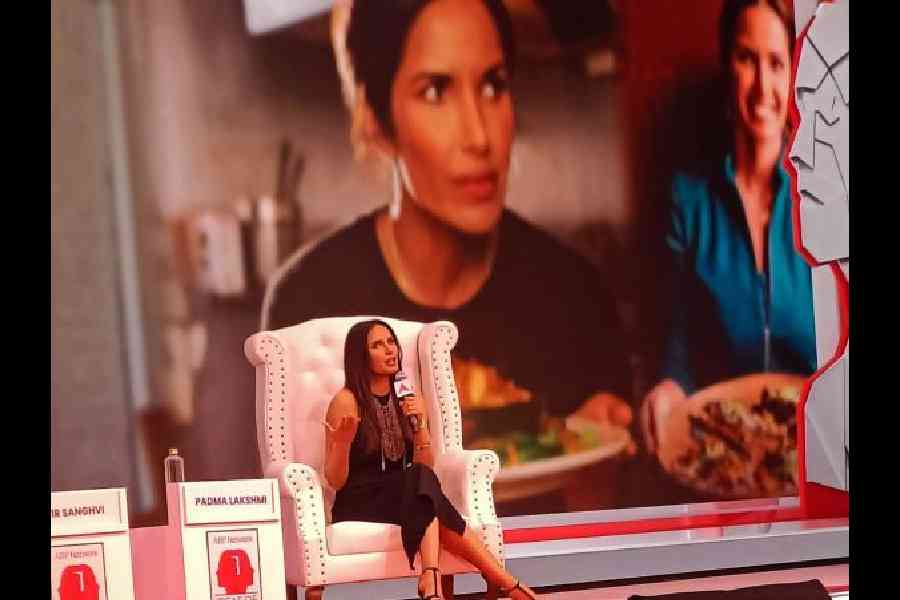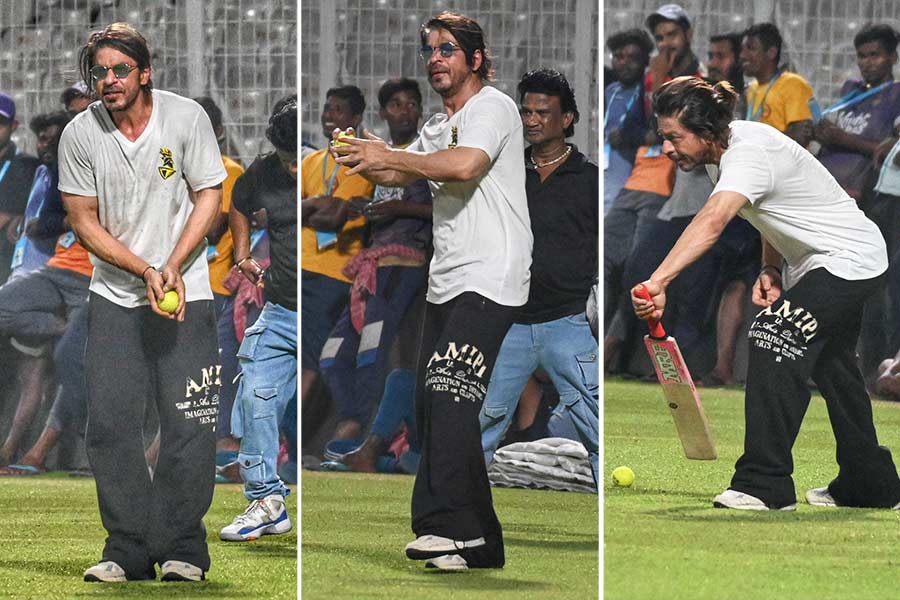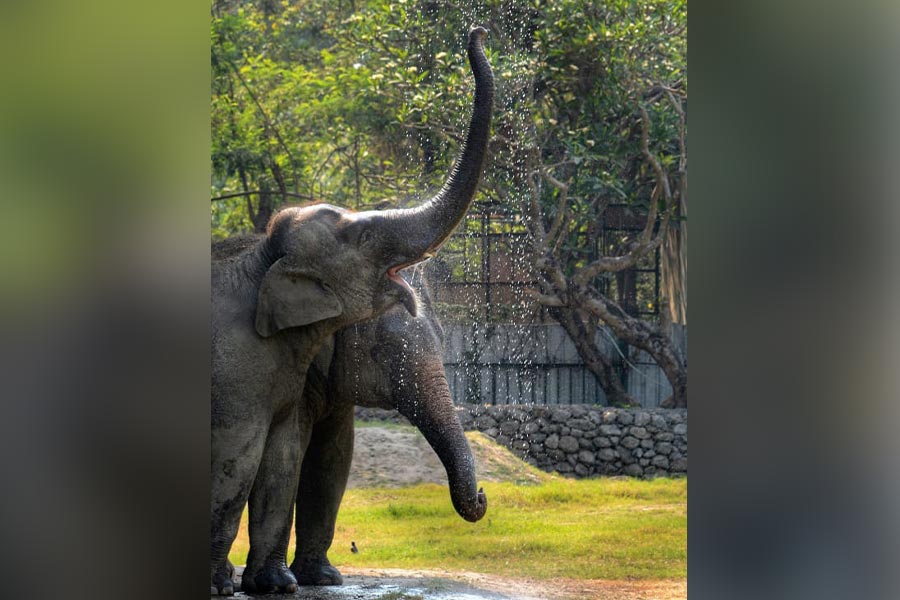Padma Lakshmi is not a name that many are unaware of. Of Indian-American descent, the 53-year-old started as a model, dabbles with the odd acting job, has taken the culinary show Top Chef to the far reaches of the world and is a bestselling author. She is also a humanitarian who works tirelessly for the cause of women’s health and her latest show, Taste the Nation, is being lauded and celebrated for bringing America’s immigrant story to the forefront through the prism of food and more.
Recently, Padma Lakshmi was in Mumbai as a speaker at the ABP Network Ideas of India Summit 3.0. In a moving and motivating session moderated by journalist-author Vir Sanghvi, she opened up on her early life, the father she never knew, being a woman of colour in America and how she converted the setbacks in her life into opportunities. Excerpts.
Vir Sanghvi: Though we think about her as a New York person, Padma Lakshmi was born in Delhi’s Safdarjung Hospital...
Padma Lakshmi: Yes, my grandfather lived there, so my mother went there to have me. For the first four years of my life, I lived in Moti Bagh. I still love going back to Delhi. It has the best chaat. Food is my priority when I come to India. I always have a mental list of all the food that I am going to eat.
And your other home was in Chennai which you kept going back to...
I grew up mostly in America. My mother had a very troubled marriage with my father, and in the early ’70s, she took the radical decision to get divorced. She moved to America and I stayed with my grandparents till age four. My grandparents then moved to Chennai. We are Palghat Tam Brahms (Tamil Brahmins) and they wanted to be closer to their roots. I grew up shuttling between New York and Chennai. I would spend most of my summers in Madras for three months every year. I still feel very connected to my Indian heritage and my family there.
You had quite a tough time growing up. Your mother didn’t have that much money. You struggled almost all the way through, till, as your memoir says, you ended up in Italy. How did that happen?
People always ask me: ‘How did you plan your life?’ The truth is that I didn’t plan anything. I did the best I could with the opportunities that came to me. There are a few young women I mentor in America, some of whom I have had a relationship with for 15 years. But I never had a mentor, there was no guidebook for my career and so I wanted to make it easier for them. I always tell them: ‘Push against the open door’. The opportunities that come to you may not be the exact ones you planned for your life or career but you never know where it will take you. I read somewhere that Steve Jobs (founder of Apple) took a calligraphy class in college and that came in handy when he was designing the iPhone. All the things I have done in life have led me to the career that I have.
I had college loans and very big loan repayments. For me, modelling was not this glamorous endeavour. I was doing very low-level modelling, but it allowed me to pay off my college loans, it allowed me to be independent and it was a means to an end.
I don’t think I would have a career as a writer and in food today if I hadn’t had the opportunity as a young person to travel and see the world. That is an education that in itself I could have never had coming from the socio-economic background that I did. Whenever I meet young people who are interested in food, I tell them to hit the road because that is what made me the person I am today.
I was always travelling between Indian and American cultures. When I went to Madras, I was never Indian enough and when I was in America, I was not American enough because of how I looked. Today, it is a lot easier in America and I would like to think that my show Taste the Nation has something to contribute to that conversation, to say that: ‘Hey, Indians or Chinese or Mexicans... whatever your ethnicity is, you have contributed to the success and the world dominance of the American economy.’ We are why America is great. We have taken the best of all our cultures and brought them to bear on our work and our lives and settled in America.
I wanted to shift the language a little bit because people in America think that patriotism is the sole domain of a White person who is a Republican and I disagree with that analysis. Taste the Nation is an attempted act of patriotism on my part to acknowledge all of the contributors to what makes America not only an economic powerhouse but also a social and cultural powerhouse. America is attractive to young people because of music, television, film and all those art forms that have been shaped by the contributions of the many immigrants or descendants of immigrants who have settled there.
You were an Indian in America before there were many Indians in America. You have talked about being bullied in school and facing racial abuse. How did you take that?
I look back at my life, and I am not just saying this to be virtuous, but I thank those bullies because it was a great training ground and they helped me develop a thick skin. When you are a woman — especially a brown woman in entertainment — the first thing you need is a thick skin! I knew that the barriers to achieving what I wanted would be plentiful and higher than that for somebody else. I didn’t know about the business, I learned everything the hard way.
I didn’t come from money, my mother is a retired nurse and my stepfather is a plumber. We had a very working-class existence. But I do think that all of the difficulties that I had — whether it was my car accident or being publicly shamed at times in the media — made me who I am. I don’t think I would be as strong today if I didn’t have that.
In your memoir, you say that when you started, you never thought of yourself as beautiful or even attractive...
I am a 53 year-old-woman and the world is constantly telling you that your time is up. I am here to tell you that time is not up at all! When I was growing up, I didn’t see anybody who looked like me. I felt I was attractive based on how people reacted to me but the models on the catwalk and in ad campaigns felt like a different species. It was only when I went to Italy and started modelling there that I began to feel: ‘Okay, maybe this is a viable career.’
I had mixed feelings about modelling because I come from a very conservative South Indian family and I am very much my grandfather’s child. I was concerned about how they would feel and it was not the plan that I had for myself. I was a literature and theatre major but modelling was the best opportunity that came to me and I had no choice but to take it. And frankly, I was very thankful for it.
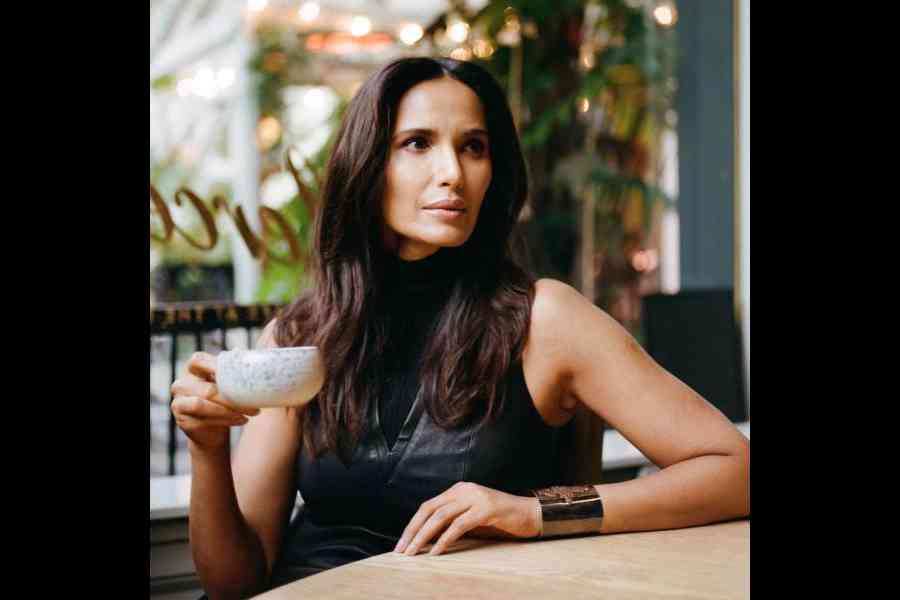
What did the accident, which left you with a permanent scar on your right arm, do to your confidence?
I had a car accident when I was 14 and I almost lost my right arm. It was shattered into a million pieces. My mother took me to another surgeon who said: ‘Well, she is so young, let’s try to save the arm.’ And thank God for him and for her not giving up, because he did save my arm. I never thought I could model because I started modelling in the early ’90s when there was no retouching. I got very good at covering it up with make-up and positioning my body in a way so that the scar was not an issue.But it did impede my modelling career a lot. I did it for the money and I thought I would do it till I started working in film and television. I didn’t have a lot of confidence, I just thought it was another job.
And then Helmut Newton, one of the world’s greatest photographers, shot you. He found you stunning and he loved the scar. Tell us that story.
Helmut Newton was a German photographer who found me and insisted that I shoot with him. My agency was excited because he was such a big name. I found out I had to pose nude and I cancelled the job because I was nervous. I had never done anything like that. I said: ‘Look, I don’t feel comfortable’. I turned the great Helmut Newton down. But six weeks later, he called back and said: ‘It is not going to be nude. What if it is just topless and we position you? It is your scar I want to show.’ And I said: ‘Okay’. I was still nervous but the atmosphere in the room was not sexual at all. It felt like being with my grandfather. He was very kind and it was the opposite of what I thought it was going to be.
The pictures came out and within three months, all the designers who had previously said I couldn’t be on their catwalks or could only walk with full sleeves, made sure I was in short sleeves so that the scar would show because Helmut Newton had made it cool.
One thing that taught me is that the standards of beauty are very arbitrary. When I was growing up in India, everyone in my family would try to feed me because I was so skinny. But when I was in America, there were completely different beauty standards. This is an experience that every immigrant kid goes through, there is a lot of code-switching. But none of us are the same person all the time. That taught me how to be a little bit of a chameleon and how to navigate each situation in the most appropriate way.
All the things in my life that I thought were impediments or that made me different and so not as much of a saleable product or talent, were the things that, in the end, gave me success. I was lucky.
You are a role model not just for brown women, but for women all over the world, especially in America. You are brilliantly put together, articulate and confident and yet judging by your memoir, you weren’t like that for much of your early life...
I wasn’t very confident because the world gave me lots of reasons to be insecure. When I am shaking inside even now, the only thing I remember is how much my mother suffered and how many sacrifices she had to make. What she did was very taboo in the ’70s. She made a new life for us and I want to pay her back, I want to make her proud. And I think that even my grandfather, as conservative as he was, approves.
I am not immune to seeking approval from those I respect. But at the end of the day, you realise that you have to make your code of ethics, your code of what is right. There were times when people advised me to do things differently. But I had to learn to listen to that voice in my head. I tell my daughter (Krishna) that all the time. Physically, just go into a private place, even if it is a bathroom stall in some hotel, and ask yourself: ‘What do you want?’ And if it is a ‘yes’ or ‘no’ question, I guarantee you some voice, some feeling inside your body — whether it is in your gut or heart or mind — will tell you what the right answer is. The only time I have misfired is when I haven’t listened to that voice. That voice is like a muscle. The more you use that voice, the stronger it gets. It is not that I am very confident now. I still feel incredibly insecure in certain situations.
Certain things have happened to me in the last few years that I would have killed for to happen to me when I was 25 or 30 but I also think that now I can savour them a lot more and put them in perspective. I am who I am, whether my (TV) shows are very popular or I don’t have any shows at all. That takes a lot of self-talk. It takes talking yourself down emotionally from a cliff and saying: ’It is okay. Life is long. You have to do what you think is right.’
In your personal life, you have suffered pain, loss and death. And yet you seem stronger now...
Two days before my car accident at 14, I had a very rare disease that landed me in the hospital. I got out of the hospital on Friday and then got right back in on Sunday. My mother was quite religious but the temple closest to our house was 50 miles away. On the way back from doing an archana, we had a car accident and I was in the hospital for months.
I have also had a very public breakup which was difficult. I never had a relationship with my biological father. Every time I would come to India, I would go to restaurants or canteens and wonder if anyone out there was my dad. I didn’t even have pictures of him. When my parents divorced, I was only two and they ripped up all the pictures. He made my mother sign an affidavit saying she would never ask for support from him in exchange for divorce and to allow her to take me out of India.
As a result, from a very young age, I had this feeling of not being good enough because my father had rejected me. Whatever happened between them in their marriage was between them. But why didn’t he want me is what I would always ask myself. That was a very difficult thing to go through.
I don’t know about the medical history of one half of my family and I am reminded of it every time I go to the doctor. I don’t celebrate Father’s Day. Recently, I got a phone call informing me that my biological father had died and that he had died a year ago. I didn’t know about this till a month ago. As soon as I hung up the phone, I burst into tears. I thought: ‘Why am I crying? How can I miss something I never knew?’ But I think I am mourning because all those feelings of being a child who didn’t feel wanted have come up again as a grown woman. Grieving without a memory is like bleeding without a wound. You don’t know where it is coming from.
But at the end of the day, I also have to thank my father. Him rejecting me made me that much more ambitious, and made me want to prove myself. I may not have become the person I am if we never went to America. My mother would have had a nice upper-middle-class marriage, and that would have been it. So even the most difficult things that I have been through have been a benefit in some way. What has also saved me from the abyss is having a sense of humour. I don’t want this to turn into a sad talk, because it is not. It is a happy talk.
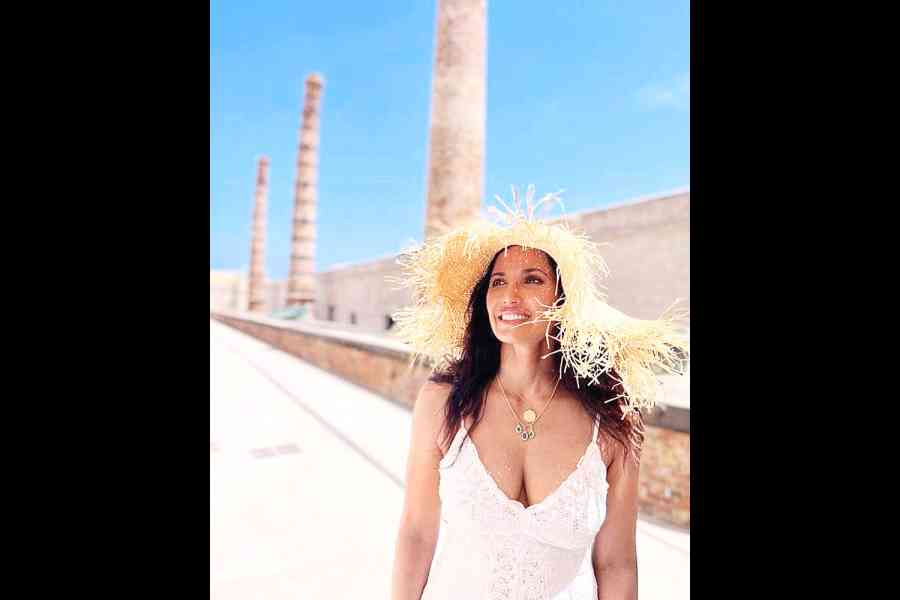
One of the things that you have gone through in your life is how much difficulty women have with their health often because things are not diagnosed properly. They don’t talk about it. They suffer. They are almost made to believe that it is their job to suffer as women. Tell us about that.
I had endometriosis. It is a very nasty disease that affects a woman’s reproductive system. Preliminary research says Asians are more predisposed to it. But we don’t have enough funding to back that up. I had terrible pain. I was in bed one week a month during my period. I am a pretty outspoken person but the last thing I wanted to do was get up on a stage and start talking about my vagina. It is so unsexy. But I felt it was important because once I finally got the treatment that I needed, I realised what life was like for women in this world.
In 2009, I started a foundation with my surgeon to educate people about it to raise money for research and to increase awareness. We have a programme that has, till now, educated 35,000 teenagers about the disease in the tri-state area of New York, New Jersey and Connecticut. We have also changed laws in the state of New York to say that any time there is sex education, you should also teach about this illness and other illnesses of women’s reproductive system like PCOS and fibroids.
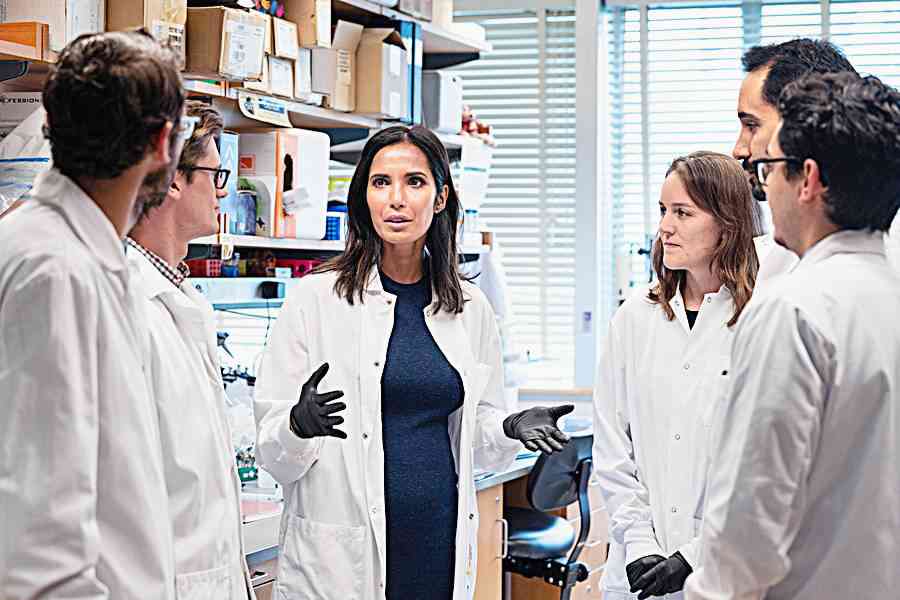
Padma Lakshmi speaking on endometriosis at Massachusetts Institute of Technology (MIT)
We insist on going to the science class because we want to educate boys too. A boy who understands it will become a better brother, father and husband. We have managed to double the funding that the federal government gives to this illness and also fund research in many different hospitals and universities. We have also managed to change how medical schools teach this illness. We opened a centre for research of gynecologic pathology, the first of its kind in the country, with MIT, along with Harvard Medical School. I am proud to say that it will probably be the thing that I am most known for.
Right about the time I got divorced (from author Salman Rushdie), I was told that I would never have kids and it devastated me. I was 36 and single and I knew I wanted to be a mother. That anger is also what catalysed me to start the foundation. Now, women come up to me and say: ‘Thank you for helping me. My doctor didn’t listen and then I showed him this video. I told him to go to your website.’ It has been the honour of my life to be able to change people’s lives. How many people get an opportunity to do that?
In the short run, you are most remembered for Top Chef. You were, as far as I know, anywhere in the Western world, the first Indian personality to go on to a food show and be there because of who she was and not because you were going to be making dosa or chola bhatura...
I enjoyed it. It allowed me to meet chefs from all over the world. Top Chef is in 175 countries and it is the world’s most powerful food show. In the industry, it is known as the gold standard. I am not a chef and I don’t want to be one. I am a food writer. So when I first got the job, people were a little sceptical. Stuff like: ‘What does this ex-model know about food?’ I also suffered from imposter syndrome. But whenever I am insecure, the only thing I know to do is put that energy into research or hard work or studying or whatever occupies my mind and it is an antidote to that.
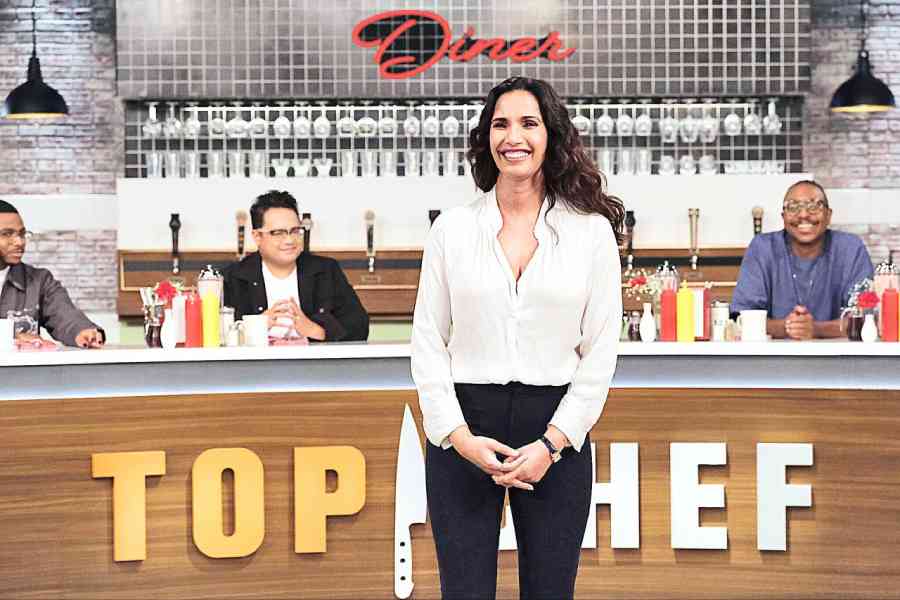
Padma Lakshmi was a part of Top Chef for 20 seasons
That is what I did and over the years, just out of sheer will and dedication, I was able to earn the respect of my colleagues for them to say: ‘She does know about food.’ All the women in my family were great cooks. I learned about spices and Indian food from them. And then spending my 20s as a model in France and Italy taught me about European cooking techniques. All those things are valuable. When I started Top Chef, I had no idea it would become a cultural phenomenon. I did it because I thought it would give my cookbook a little boost and it certainly did.
In Taste the Nation, you capture the diversity of America. You have travelled and found out things that I had never imagined about American food. What made you do that?
I think it was my experience of working in 2016 during the (US Presidential) elections. I started working with the American Civil Liberties Union (ACLU). I was very disturbed by the vitriol that was coming out of (Donald) Trump and his camp. Things like bans against immigrants and Muslims and branding them as criminals. The truth is immigrants are the lowest perpetrators of crime in America. They pay the most taxes.
America is so interesting and I believe that everybody has an interesting story to tell. You just have to be willing to listen. Top Chef is a very big accomplishment but I didn’t create that show. Taste the Nation is completely my creation. What people don’t realise is that 75 per cent of what I do on Taste the Nation is behind the camera. I have a whole bunch of producers who report to me. I research and write the show.
Once you start doing your material, you never want to be in anyone else’s project. I’m not saying I am not going to. I still have a big house and office to run and I need money to spend and pay for. So I will do what I have to. But it has been great because I have had Black people come to me and say they never knew about the Gullah Geechee community and others speak about how they found out about the Thai community in Las Vegas through Taste the Nation.
The best stories are ones which make Americans interested in their neighbours, ones that make them less afraid of somebody who has a name you can’t pronounce or eats food that you don’t know about. At the end of the day, we all want the same thing. We want to take care of our kids. We want a nice house so we feel safe and we can be nurtured and flourish. We want to take care of our elders when they get old. Those values are not Indian values or American values... they are just values. I like to think that there is more that connects us than what separates us.
So after working with the ACLU for seven years and interviewing different kinds of immigrants, I got a full legal education from one of the country’s most eminent scholars on immigration law and went down to the Southern States. I went down to the Hawaiian border in Brownsville, Texas. I walked on foot in Matamoros and in Reynosa, two of the most dangerous border crossings, to see what it is like to go through the process of asylum.
Taste the Nation is a direct product of my civil rights advocacy work, it is informed by that. Rather than getting on my soapbox and lecturing people, this is a softer way to do it. Nobody wants to talk about politics or religion but they will all tell you about their grandmother’s favourite recipe for cookies or whatever. It is a good Trojan horse to get people to open up. I am indebted to all our participants who open their homes, who share their lives, who talk about some really painful things on our show. So many teachers write to me to say that they are showing Taste the Nation in their classrooms because it is much better than anything in our history or social studies books about what America is like.


